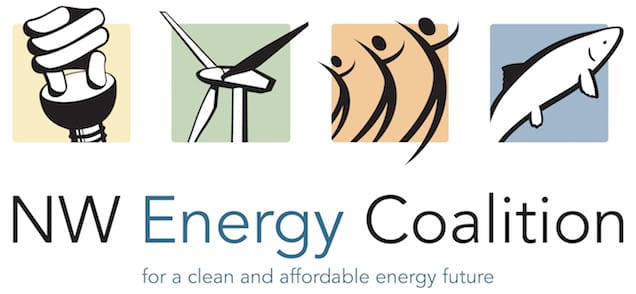Policy
Oppose Tacoma Power's request to double its customer service charge
Tacoma Power says the proposed increase is the best solution for low income customers. It’s not. On Tuesday, March 7, Tacoma City Council will consider a request from the public…
Spring 2017 Clean & Affordable Energy Conference — Boise!
Join the NW Energy Coalition on May 5th, 2017 for our Spring 2017 NW Clean & Affordable Energy Conference, the region’s premier clean energy conference! Today’s most important energy topics…
NWEC supports Sen. Ron Wyden in defending the BLM Methane Rule
Rule’s repeal would pollute the atmosphere and cost taxpayers hundreds of millions of dollars Today, the NW Energy Coalition and the Western Environmental Law Center announced their support for U.S.…
NW Energy Coalition supports Clean Energy First Act in Olympia
At a moment when it’s imperative that states take the lead in fighting climate change and promoting clean air and water, the NW Energy Coalition is joining five other groups in proposing the Clean Energy First Act (HB1334) in the Washington state legislature.
Remarks of Nancy Hirsh Executive Director, NW Energy Coalition Lower Snake River Dam Rally December 1, 2016
“All of us who live in the Northwest are being threatened. We’re being told that, if we remove the lower Snake River dams to restore wild salmon, we’ll have to build natural gas-fired power plants that will spew carbon dioxide into the atmosphere and drive up electric rates. In short, we’re being told, we can save wild salmon or we can have clean, abundant, affordable electricity, but we can’t have both.”
NWEC Executive Director to speak at Save the Salmon Rally.
NWEC Executive Director Nancy Hirsh will speak this afternoon at 4PM at a rally to call on the Bonneville Power Administration and other federal agencies to conduct a thorough and fair investigation to determine whether the electricity generated by the lower Snake River dams that inhibit salmon migration can be replaced by other clean, renewable power options.
Clean up the grid and electrify everything
Amid uncertainty about what recent election results will mean for environmental policy and the fate of the planet, a remarkable clarity pervaded the NW Energy Coalition Clean & Affordable Energy conference this past Thursday in Portland. David Roberts, Vox energy and climate columnist and the conference’s keynote speaker, opened the day by reminding an audience of more than two-hundred that, regardless of coming battles and possible changes in energy and environmental policy both in Washington DC and in the Northwest, there remains a simple imperative. If we are to avoid doing catastrophic damage to the planet and to ourselves, “we must clean up the grid and electrify everything.”
Press Release: What I-732’s defeat means
The defeat of I-732, the carbon tax, should not cause anyone to question the depth and breadth of support for action to combat climate change among Washington voters. As has been widely noted, the solution embodied by I-732 divided a community that is otherwise united in its commitment to developing policies to reduce greenhouse gas emissions.
NWEC is currently hiring!
We are excited to announce that we will be hiring for a Energy Efficiency Policy Associate. This position will analyze, develop and advance energy efficiency, demand response and low-‐income energy policy and program implementation, and address other utility regulatory issues affecting clean energy. The position will remain open until filled. Start date is as soon as possible. The NW Energy Coalition is an equal opportunity employer.
Transportation Electrification in the Northwest
Early in the 20th century, petroleum became the dominant fuel for cars, buses, trucks, vans, marine vessels and railroads. While natural gas plays a role in the commercial fleets, electricity and other renewable fuels are poised for expansion of use in transportation, thereby linking more closely the transportation and utility sectors. It’s a transition from which the Northwest, which is blessed with low-emission electricity, is uniquely positioned to benefit.











